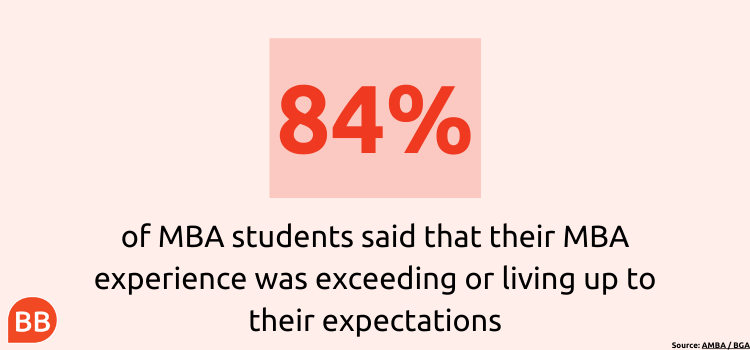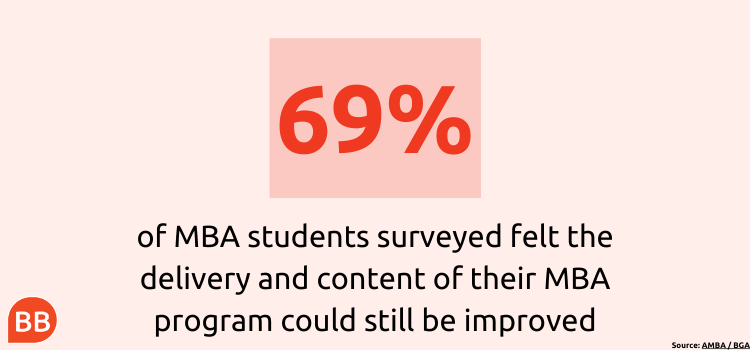Despite COVID-19 causing huge disruption to higher education during the past year, 84% of MBA students say their business school experience is either exceeding or living up to their expectations, according to new research from the Association of MBAs (AMBA) & Business Graduates Association (BGA).
That’s despite many business schools shifting to online learning and social distancing impacting the interactive elements of an MBA.
The findings, from a survey of 752 MBA students, highlight how business schools are weathering the storm in the face of unprecedented changes to learning.
The shift to online learning
Not only are students pleased with the overall MBA experience so far, but in terms of teaching, 25% of students surveyed rated their teaching as excellent, 43% as very good, and 23% fairly good. This comes as lecturers and tutors had to quickly adapt to online learning too and faced their own challenges in doing so.
Only 2% of students said that the quality of teaching has so far been fairly poor, very poor, or terrible–a good sign for prospective MBA candidates considering online teaching may be here to stay long term.
“The findings reveal that, for the most part, the class of 2020 was riding the chaos of the current global uncertainty and making the most of their unique MBA experience,” says David Woods-Hale, director of marketing and communications at AMBA & BGA and author of the report.
“Participants also recognize the work being done by their schools to mitigate the challenges caused by social distancing and remote learning, with several remarking that the continuity arrangements were impressive, allowing them to still enjoy their experience, despite the effects of Covid-19 lockdowns, that were out of the hands of their schools."

MBA value for money
While 84% of students’ expectations are being met, 69% of survey participants felt that the delivery and content of their MBA program could still be improved.
Under a third of students (32%) said their degree had so far provided very good value for money, with 48% saying it had provided fairly good value. Meanwhile, half of students surveyed think there could be better networking opportunities at their schools.
It is important to note that the survey was carried out at the peak of lockdown and travel restrictions in relation to COVID-19. However, networking is another factor of education that can be carried out online.
In terms of MBA development and keeping up with the zeitgeist of business trends, 43% of students think the partnerships between business schools and companies could be improved; equally, 43% also suggested improvements for teaching modern business trends like AI and data.
MBA careers and COVID-19
There are many reasons for choosing to study an MBA. The most popular reason cited among students—with 70% choosing this option—was ‘to acquire more skills and knowledge about the business world’; closely behind at 69% was ‘to expand my area of expertise’.
Other reasons cited were ‘to get a broader understanding of how business should be managed’ (53%); ‘to change career’ (51%); and ‘to help differentiate myself in the job market’ (49%).
All of the above contribute in some way to enhancing a candidate’s career post-MBA. But although teaching is holding up amid COVID-19, there are mixed results when it comes to career support.
48% of respondents said they were engaging with careers support at business school, with 49% saying they were not.
For the 322 participants that said they were using their school’s careers service, 80% rated the service either excellent, very good, or fairly good—this looked at the advice candidates received in terms of job applications, CVs, and interview prep.
Just under two-thirds of the participants (65%) rated their school’s networking with employers as excellent, very good, or fairly good. Job search facilities are also received positively by the sample, with 65% rating them as excellent, very good, or fairly good.
Though a strong performance among candidates who used them, school’s career services will no doubt be under pressure amid the damage caused by the pandemic to the global economy.

Post-MBA options, post-COVID
The current MBA students surveyed will be graduating into a world still coming to terms with COVID-19.
And despite employment worries, 54% of those surveyed do not intend to return to the job they held prior to the MBA; 33% are planning to move to a new company in the same sector as they already operate, and 29% plan on moving to both a new company and different sector.
On the entrepreneurial side, 16% of the students plan on kickstarting their own businesses upon graduation.
In terms of location, more than half of students (55%) intend to stay in the same country as their school, 24% plan to move elsewhere and a fifth of students (21%) are unsure yet where their MBA will take them geographically.
MBA experiences remain as varied as ever, and fortunately, expectations are continuing to be met overall, despite the current situation.
DOWNLOAD our MBA Application Guide 2026




